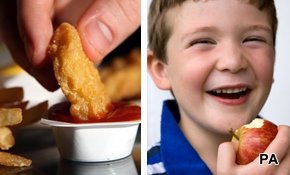Less than 10% of British people would support the idea of a book on ‘dieting’ aimed at children aged six and up, our poll has found, amid news that a children’s book called ‘Maggie Goes On a Diet’ will be released in October.
However, when we asked panellists the same question, but replacing the word ‘dieting’ with ‘healthy eating’, the idea received much stronger support.
- 48% of British people would support the production of a book on healthy eating to be aimed at children as young as six
- While 32% of people would oppose such a book
- However, when we specified that the book would be about ‘dieting’, just 9% would support such a publication
- While 81% of people opposed the idea
- Women support the ‘healthy eating’ book idea slightly more than men (50% compared to 45%) but also oppose the ‘diet’ book concept more (88% compared to 73%)
The poll comes as a soon-to-be released book on ‘dieting’ has provoked outrage from doctors and nutritionists. ‘Maggie Goes On A Diet’ by Paul Kramer, tells the story of a 14 year-old who changes her eating habits and takes up more exercise after being teased at school, and loses weight healthily, becoming more accepted at school in the process. In the book’s own description, Maggie ‘is transformed from being extremely overweight and insecure to a normal-sized girl who becomes the school football star’.
Thin equals happy?
The story has received criticism in the press and on bookseller websites such as Amazon for its use of the word ‘diet’ and what some see as its message than being thin will make you happy. However, the book’s author has defended his work, saying that ‘if one is obese, and one loses a bunch of weight, and one becomes fit, I think the rewards of just accomplishing that are good enough’.
Aimed at children from the ages of six to twelve ‒ a prime time for the development of eating disorders ‒ the book’s ‘healthy eating’ message has prompted discussion in the press in light of the fact that while the incidence of eating disorders continues to increase, three in ten children in the UK are very overweight and obesity is becoming an increasingly prevalent problem in the West. Studies have shown that childhood obesity in the UK doubled in the ten years to 2004, and is still increasing today.
‘Body-image issues’
Susan Ringwood, chief executive of the eating disorders charity Beat, said: ‘We know concerns about weight, size and shape are beginning to affect children at ever younger ages. Six and seven-year-olds already believe that their size tells the world what sort of person they are, and that big equals fat equals unpopular.
‘Diets by themselves don't directly cause eating disorders, but the combination with low self-esteem caused by body-image issues raises the risk significantly,’ she added.
Healthy, balanced diet
It seems that the word ‘diet’ is the issue, with the majority of Brits preferring to focus on healthy eating in general when it comes to young people. The NHS Choices website explains the steps parents can take to help overweight children slim down, with tips including the fact that ‘a healthy, balanced diet and plenty of physical activity will lead to a healthy weight for your child’. The website suggests ‘making changes to your family’s lifestyle’ and recommends ‘regular meals, eaten together without distractions (such as TV)’ as a good first step towards a healthier weight.









